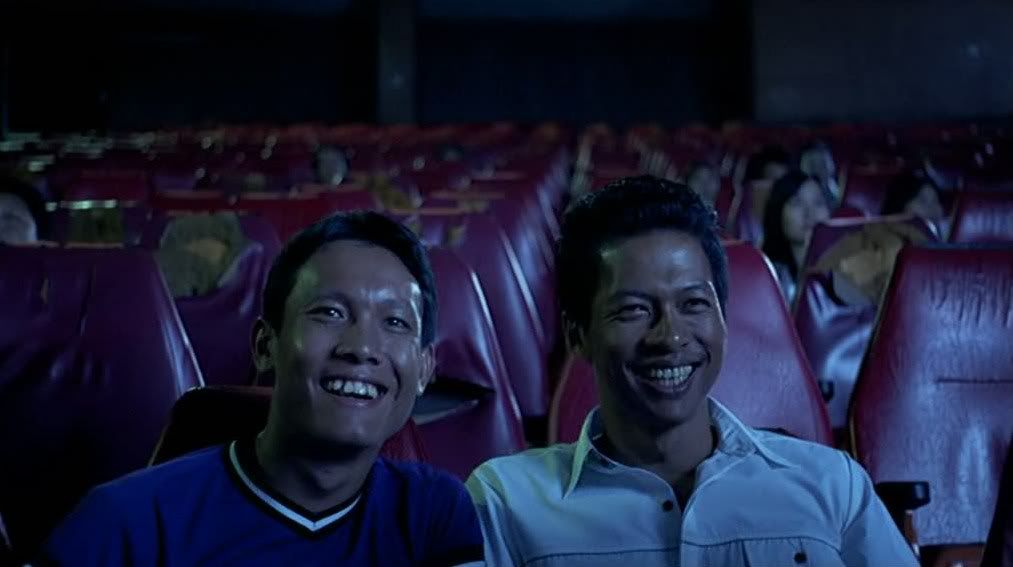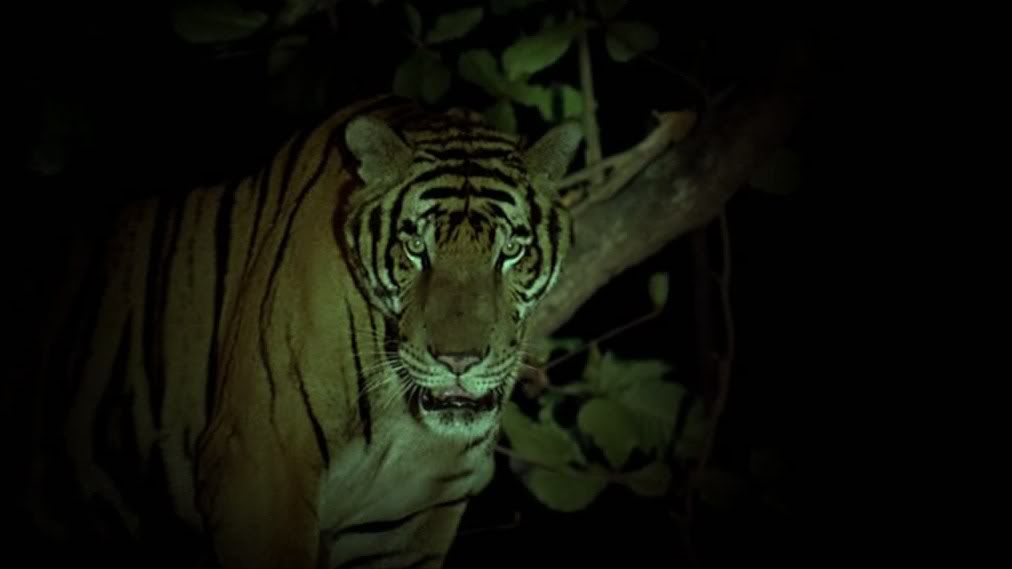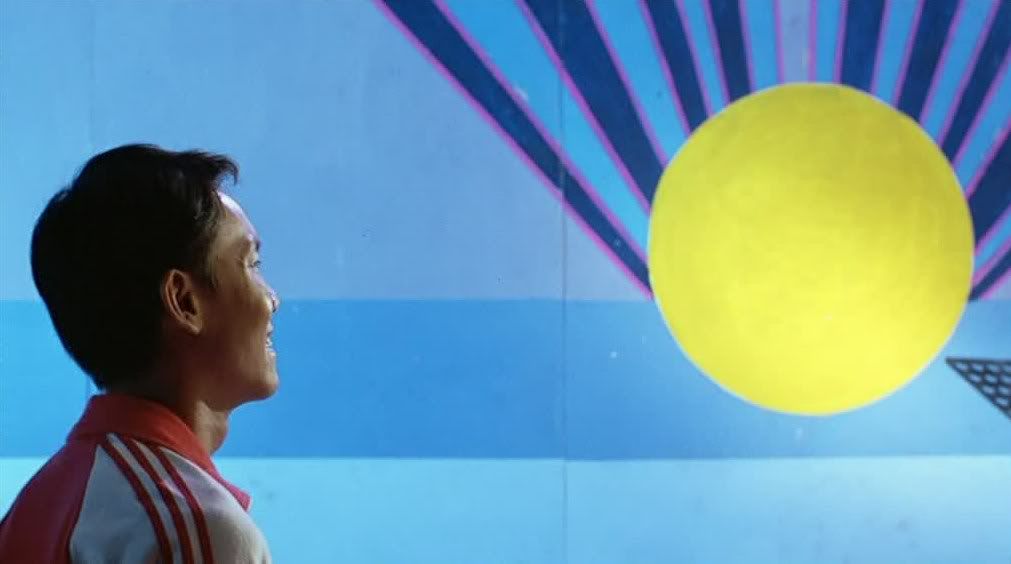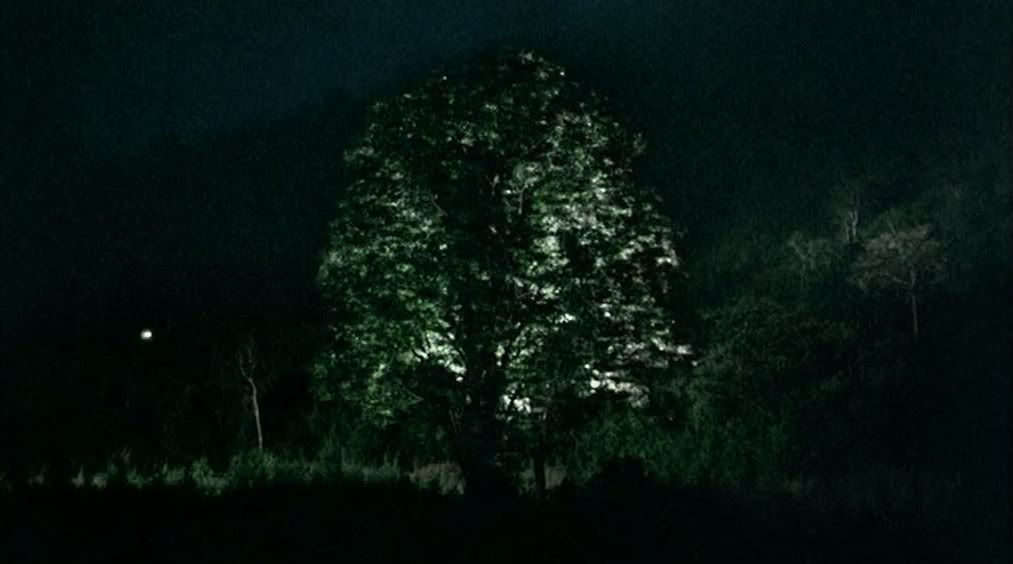

Apichatpong Weerasethakul's third feature, Tropical Malady, is a film split in two, comprising two very different perspectives on the connection between two men. In the first half of the film, Weerasethakul tells a meandering, nearly eventless little love story between two men, the soldier Keng (Banlop Lomnoi) and the illiterate country boy Tong (Sakda Kaewbuadee). In the second half of the film, Weerasethakul — inspired in equal parts by Thai folklore and the jungle adventure novelist Noi Inthanon — tells the story of a soldier (Lomnoi again) who travels into a jungle where villagers and cattle are going missing, and is stalked and haunted by the ghost of a shapeshifting shaman (Kaewbuadee) who often takes on the form of a tiger. The two halves of the film have diametrically opposite tones: a light, sensual mood that infuses the first half, with its constant shifts between urban modernity and tranquil rural lands, and the dark, somber and frightening aura that hangs over the second half's shadowy nighttime images.
The first half of the film concerns the slow, hesitant progress of a burgeoning affection between these two men who initially don't know one another very well at all. There is great tenderness and warmth in Weerasethakul's depiction of this relationship, which exists on a hazy borderline between masculine friendship and romantic courtship. In one scene, Keng politely, formally asks Tong if he can lay his head across the other man's lap, and Tong replies "no" before, with a sheepish grin, adding that he really means "no problem." Keng tells Tong then that he'd like to serenade him, that he'd like to play the guitar for him like the romantic heroes of movies, which suggests that the two men are casting themselves in a grand screen romance. In other scenes, they goof around and play like brothers or playful best friends, their physical contact ambiguous, half romantic and half aggressive. When they go to see a movie together, Keng caresses the other man's knee and starts working his hand up the inside of his thigh, but Tong turns it into a game by crossing his other leg over Keng's hand, crushing it between his legs, and they struggle a bit with each other, smiling the whole time. There are indications that Keng is comfortable in his gay identity and probably has been for a long time: he encounters several other men who he seems to know, greeting them with nods and big smiles, and there are intimations of cruising in his bathroom encounter with one man. Tong, on the other hand, is bashful and seems inexperienced, and his awkward interactions with Keng reflect an uncertainty about what exactly is happening to them.
Weerasethakul simply observes the halting progress of this relationship, which culminates in a strangely erotic and mysterious scene in which the two men kiss and lick one another's hands, the most intimate contact they've had with one another, at which point Tong turns and walks away, disappearing into a dense, dark jungle, swallowed up by the black night around him. It feels like a moment of finality and rupture, and it is, for after this, Keng's motorcycle ride home transitions seamlessly into images of him back in the jungle with his army unit, looking at pictures of Tong. At this point, the film breaks apart and the second half of the film, titled "A Spirit's Path," is introduced with a second credit sequence, as well as the recitation of the legend of a shaman spirit who haunts a certain jungle area, playing tricks on the nearby villages. Keng, possibly in a new form as a different soldier, enters the jungle searching for this spirit, for the supernatural tiger that stalks the region, killing livestock and people.


The second half of the film begins quietly, as the soldier wanders through the jungle, picking bugs off his skin, trying to keep warm in the night, listening to the mysterious rustling, crackling, chirping sounds of the jungle, which fill the soundtrack. But these prosaic, tranquil moments soon give way to an increasingly surreal and unsettling sequence of events, as the soldier fights with the shaman in his incarnation as a naked man, is warned of the dangers of the jungle by a monkey whose squealing language is mysteriously translated in subtitles, encounters the pale ghost of a dead cow, and comes face to face with a chirping firefly that might be a wandering soul, winding its way towards a tree lit up in the grainy night with thousands of similar pinprick lights. As the images and events become stranger and stranger, the soldier seems to be wandering through the dark jungle in a daze, lost in the shadows. The screen frequently goes black, or nearly black, and all sense of logic and stability is lost as the soldier stumbles towards his hysterical final confrontation with the tiger itself, a panting, hulking beast that fixes the soldier — and the camera — with an unforgettable, hungry stare, a stare that suggests that the tiger is sizing up the film's audience as prey.
The relationship between the film's two very different halves is unstated and elliptical, but the continuity in the actors, if not the characters, suggests that the second half of the film is a parable for the ferocity and danger of love, for the intensity of the connection that can bind two people together. The modern world, perhaps, is sometimes inappropriate to convey those intense emotions, the kind of emotions that defy words and explanations. In one scene in the film's first half, Tong and Keng visit a mall and Tong wanders up to a big advertisement for cell phones, adorned with the English words "connection" and "communication," but in fact the trip to the mall seems alienating and disconnecting, and Weerasethakul films Tong adrift in a sea of shirt racks and sale posters as though this was the jungle for him. In contrast, the scenes in the actual jungle convey a mysterious and otherworldly connection between the two men, or between the man and the tiger, who are drawn to one another and may kill one another or, in the suggestive words of the monkey, the man may be devoured by the tiger and enter its world. That's passion, violent and potent, infused with ancient myths and inexplicable occurrences.
The past and the modernized present coexist in Weerasethakul's cinema, blending into one another in interesting ways. Fables and legends linger on, as in the mention of an old uncle who could remember his past lives — an idea that was obviously percolating for Weerasethakul long before he made his most recent feature, Uncle Boonmee Who Can Recall His Past Lives, in which that conceit, tossed off in a few lines of dialogue here, is expanded upon. Shortly after this exchange, an older woman recounts a Buddhist parable about a monk who gave a pair of poor farmers a magical gift of gold and silver, which the men promptly lost through their greed for more — and the woman humorously, unexpectedly expands the parable through an anecdote about a similar situation on the Thai version of the TV game show Who Wants To Be a Millionaire. Fables, myths and legends remain relevant and alive in Weerasethakul's films, sometimes overshadowed by the bombast and chaos of modern life but never extinguished altogether. Such stories still resonate in the present, mysterious and beautiful and sometimes frightening.

2 comments:
Dealing with this masterpiece is key to comprehending Joe's art. I reccomend paying close attention to such early mystifying scenes of someone wandering half-naked across a field, or a bit on the bus where the camera -- apparently embodying the POV of somene or other -- regards a woman sitting across the aisle.
The seemingly neat division of gentle romance and savage devouring tiger suggests an ambivalence about the power of sexuality. But only up to a point. What Tropical Malady ultimately "means" is very much up for grabs.
David, all very true, and I definitely feel like I need to see this one a few more times to really grasp it. (And even then I suspect aspects of it will remain elusive.) It seems like sexuality is very powerful in this film - which can be destructive and frightening, as embodied by the tiger, but also more fulfilling and sensual as in so many scenes from the first half of the film. It's a great work, as with all of Weerasethakul's films.
Post a Comment